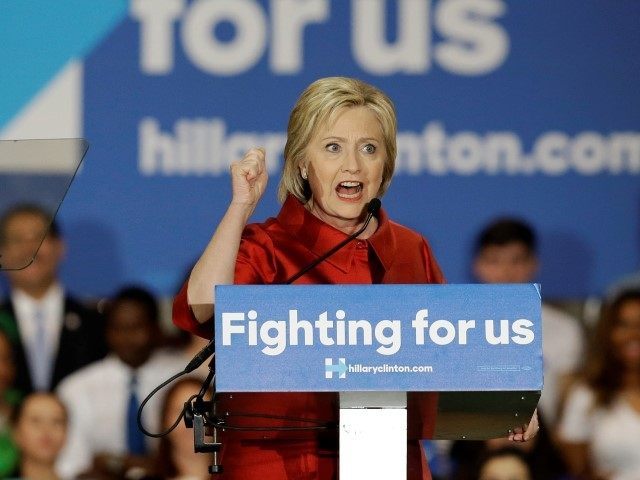TEL AVIV – How times have changed.
During the current presidential campaign, Hillary Clinton has been making great efforts to distance herself from the disastrous consequences of the U.S.-NATO intervention in Libya in 2011. Her campaign website even provides a list of other politicians who supported the operation, though it fails to mention that none of those politicians played as critical a role as she did in securing support for the Libya war.
Rewind to late October 2011. Muammar Gaddafi had been killed and the Libya campaign seemed to have been successful. It would be months before reports emerged of al-Qaida and other terrorist groups setting up bases inside the country. It would be almost a year until the U.S. Special Mission in Benghazi was attacked and Ambassador Chris Stevens and three other Americans killed.
At the time, Clinton tried to own the war as her own initiative, a narrative highlighted by the latest batch of Clinton’s emails released by the State Department last Friday and reviewed in full by Breitbart Jerusalem.
Clinton was so involved in the public relations effort following the war that after providing an interview to a Washington Post reporter for an article highlighting her central role in the Libya intervention, she personally suggested small tweaks to the already published piece, the emails show.
The Washington Post article was first titled “Clinton’s Key Role in Libya Conflict,” but was then changed to “Hillary’s War: How conviction replaced skepticism in Libya intervention.”
Reporter Joby Warrick penned a glowing profile that hailed Clinton’s “political pragmatism and tenacity in leading the diplomacy campaign to secure domestic and international support for intervention in Libya.”
Clinton’s senior advisor, Philippe I. Reines, emailed her a copy of the online edition of the article, telling her that Warrick’s piece would be splashed on the “front page of tomorrow’s Washington Post.”
Clinton wrote back asking her staff to request corrections to “a few factual errors.”
Some of her requests were blocked out by the State Department. Those visible include a statement “that the 4-way call was w Juppe not Sarkozy. bid (sic) I talk for 90 minutes w HBJ? Can you review for other issues?”
Clinton was referring to a section of Warrick’s article that stated:
In a bid to woo the Arabs back into the alliance, Clinton spoke for 90 minutes by phone with Sheik Hamad bin Jassim Al-Thani, the Qatari foreign minister, while also making repeated calls to the UAE’s Sheikh Abdullah bin Zayed Al Nahyan and to Jordan’s King Abdullah II.
“I don’t know where he got the 90-minute call with HBJ from,” then-Deputy Chief of Staff Jake Sullivan wrote back. He currently serves as the top foreign policy adviser to Clinton’s 2016 presidential campaign.
Clinton replied, “I’m sure I spoke w HBJ just not for 90 minutes.”
“Both items now fixed,” Reines wrote back to reassure Clinton.
Warrick’s article framed the Libya war as a “success” for Clinton:
Seven months later, with longtime U.S. nemesis Moammar Gaddafi dead and Libya’s onetime rebels now in charge, the coalition air campaign has emerged as a foreign policy success for the Obama administration and its most famous cabinet member, Secretary of State Hillary Rodham Clinton.
Warrick spoke to a number of Clinton aides and interviewed Clinton herself to put together the adoring profile.
He wrote:
Clinton, in an interview, acknowledged “periods of anguish and buyer’s remorse” during the seven months of the campaign. But, she said, “we set into motion a policy that was on the right side of history, on the right side of our values, on the right side of our strategic interests in the region.”
The email exchanges regarding Clinton’s role in shaping the Washington Post article are just a few examples of her direct involvement in an attempt to be publicly associated with the intervention in 2011, as demonstrated in the private emails.
In another exchange, Sullivan sent Clinton a draft State Department outline of Clinton’s role in the Libya war entitled, “Secretary Clinton’s leadership on Libya.”
Clinton wrote back complaining that the extensive outline missed “much” of what she did to ensure the Libya intervention. She wrote: “What bothers me is that S/P prepared the timeline but it doesn’t include much of what I did. So where did they get info? This is example of my continuing concern that we don’t have our records ready.”
In August 2011, after Tripoli was captured by rebels, Clinton confidante Sidney Blumenthal advised her to take credit for the purported victory.
“[Y]ou should of course make a public statement before the cameras wherever you are, even in the driveway of your vacation house,” Blumenthal wrote in an Aug. 22, 2011 dispatch.
“You must go on camera. You must establish yourself in the historical record at this moment. … The most important phrase is: ‘successful strategy.’ ”
“This is a very big moment historically and for you. History will tell your part in it. You are vindicated,” he wrote.
Aaron Klein is Breitbart’s Jerusalem bureau chief and senior investigative reporter. He is a New York Times bestselling author and hosts the popular weekend talk radio program, “Aaron Klein Investigative Radio.” Follow him on Twitter @AaronKleinShow. Follow him on Facebook.

COMMENTS
Please let us know if you're having issues with commenting.